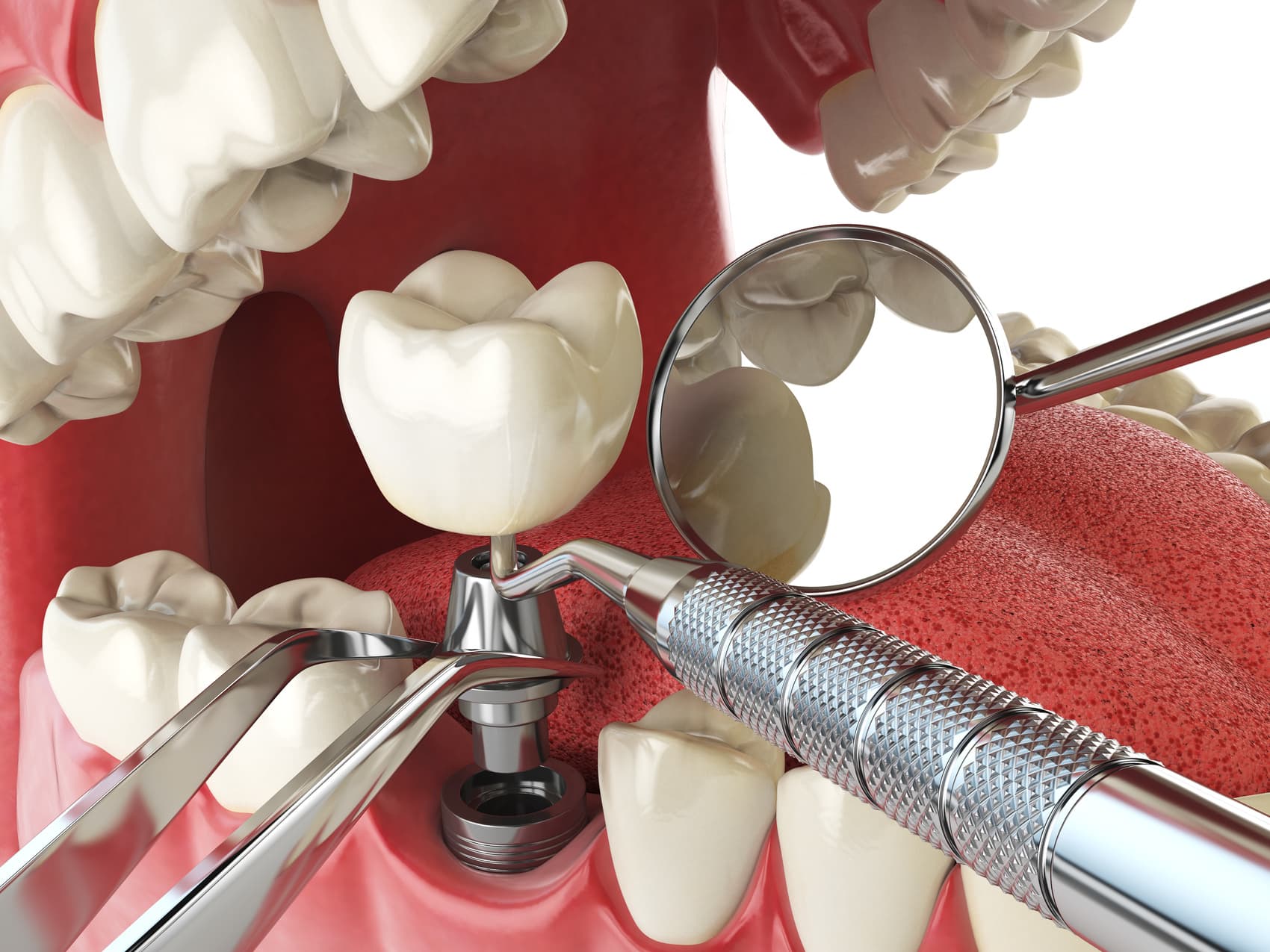Dental implant
The dental implant is an artificial rootstock made of metal to replace lost teeth.
A missing tooth should be replaced as quickly as possible. A missing tooth is not only an esthetical issue but in this case also dental health is in danger. The neighboring teeth of the gap can move into the gap. Later, even the whole row of teeth can tip over. Tilted teeth are an ideal breeding ground for harmful bacteria and more plaque is formed. Disorders of the mastication function can cause indigestion or chronic pain. Therefore, the tooth gaps should be closed not only in the visible area, but also in the posterior tooth regions.
WHAT ARE DENTAL IMPLANTS?
Dental implants are artificial titanium roots that are surgically attached to the jawbone and hold the artificial tooth or teeth. Protheses and bridges supported by implants do not slip, which is a great advantage when eating and talking. This secure grip gives a more natural feeling when worn.
ADVANTAGES OF IMPLANTED DENTISTS
- In those cases where only one or two teeth are missing it is not necessary to skive the healthy teeth to create the bridge.
- In case of missing back teeth instead of removable prosthesis, fixed supplement can be made i.e bridge, which is more comfortable than the removable prosthesis.
- In case of full teeth loss, that kind of prosthesis can be made with small number of impants, that will not move during chewing or speech. Depending on the state of the edentulous jawbone, the missing teeth can be replaced by bridge with more implants.
- It prevents the inevitable bone resorption after tooth loss. It makes easier to maintain social relationships by giving sense of security and comfort during chewing and speaking.
WHAT MATERIALS ARE IMPLANTS MADE OF?
Into the body only those kind of materials are placed in, which does not cause any harm, the tissues tolare it and not eject it. These materials are called “bio-materials” such titanium materials from which the implants are made of.
Hip prostheses are made of titanium as well. The shape of the dental implants are usually cylinder or screw.
Certain products’ surface is covered by tissue-friendly material which helps the fast incorporation into the bone.
WHEN DOES IMPLANTATION MAKE SENSE?
If individual teeth are to be replaced, the implant is suitable for replacing the missing tooth without having to abrase the neighboring teeth. In the case of a terminal tooth loss, or if one or more teeth are missing. In such cases, only with the help of implants a fixed solution, a bridge, is possible. This denture is more comfortable and easier to clean than a removable denture. In the case of complete teeth loss, implantology offers two options with high wearing comfort: the removable, implant-supported prothesis or the fixed row of teeth. With the help of 4-6-8 implants a toothless jaw can be completely restored. The palate of the upper jaw remains free, is not covered by prothetic material, patients can taste again and enjoy carefree chewing/eating.
BEFORE IMPLANTATION
Before treatment it is determined in the context of a detailed examination and consultation, whether the implantation is possible and useful. Patients will be informed about treatment alternatives and risks. In the planning also the personal wishes of the patient are taken into account. Various types of X-ray images can be taken for the exact planning of the implantation (panoramic radiograph (OPG), CT scan)
WHO CAN HEVE IMPLANT?
Those patients are suitable for implantation who are in good health, good oral hygiene and have enough bone. During the preliminary tests, the doctor informs the patient about treatment and surgical procedures, as well as denture design.
WHAT ARE THE RISKS OF IMPLANT SURGERY?
The implant surgery happens under local anesthesia, the complications of this is like any anesthesia. Of course, these can be prevented with the right wariness. During the surgery the surrounding structures (sinus opening up, nerve injury) can be damaged, but with careful planning and good surgical technique, this is avoided. The rejection of the implant is extremly rare. In case of good oral hygiene and regular monitoring the chance of it is very small.
HOW ARE THE IMPLANTS ARE IMPLANTED?
The implant requires an especially careful planning and implementation from the dentist and dental technician.
The doctor first will be informed of the general state, diseases and medicines of the patients. This will be followed by a thorough dental examination. In every case X-rays will be made, and if it necessary, three-dimensional CT image as well. After mucosal cutting the jawbone will be released and there will be a a suitable location for the implant where the artificial root will be placed and the wound will be sewed. So the implant covered like this heals for 3-6 months and during this the implant “ossifies” (the bone grows on the implant thus it will be locked). During the period of the healing a temporary prosthesis can be worn. After surgery, a smaller facial swelling may occur, but no need to be afraid of more pain. After the healing making a very small cutting on the mucosal the implant will be released, and a gum shaper screw will be placed in. After a short time comes the impression, based on which the dental technician makes samples and prepare a prosthesis. And it is the dentist responsibility to place the dental work in the mouth.
HOW LONG DOES THE WHOLE PROCEDURE TAKE?
The duration depends on the number of implants and the necessity of bone structure. In most cases, when only one tooth is involved, the procedure takes only one hour.
DO I REMAIN TOOTHLESS AFTER THE IMPLANTATION?
If the implant will be placed in the front part of the mouth the dentist will make you a temporary denture or bridge not to remain toothless. In case you have a full plastic denture, you can wear it during the whole time of the healing period after it is transformed.
IMPORTANT INFORMATION AFTER THE IMPLANTATION SURGERY
- Place ice packs outside the surgical area to reduce swelling.
- Do not eat until the anesthetic takes its effect.
- Do not drink coffee, tea, alcohol, do not smoke or eat spicy foods for one day.
- Pay attention to the oral hygiene, brush your teeth – except for the area around the implant – properly but including the wound, and gargle with an antiseptic solution according to directions. Take the recommended medications.
- Take pain killers as needed.
- The sutures are removed in 7-10 days.
HOW TO LOOK AFTER THE IMPLANT?
Just like like natural teeth, ie brushing and with dental floss 2x daily. Using the dental floss and teeth brushing is very important. Also pay attention to the importance of the regular dental control.



